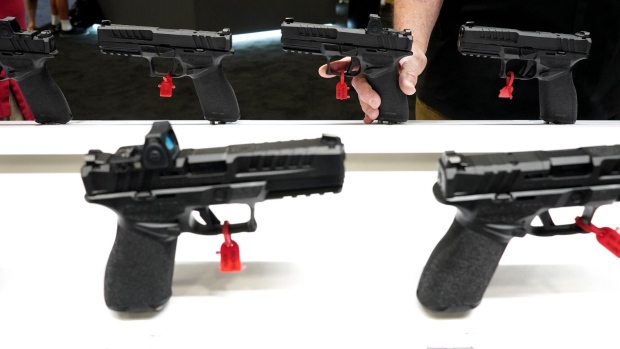Jul 2, 2024
Supreme Court Sidesteps New Gun Cases as It Closes Out Term
, Bloomberg News

(Bloomberg) -- The US Supreme Court opted not to add any new gun-rights cases to its agenda for the fall, sidestepping a bevy of appeals over the Constitution’s Second Amendment as the justices wound down their nine-month term.
The court refused to hear challenges to bans in Illinois on assault-style weapons and large-capacity magazines, turning away a group of appeals that contended the state and local measures violate the Constitution’s Second Amendment.
The justices also told a lower court to take a fresh look at New York’s new concealed-carry licensing rules and its ban on weapons in buses, parks and crowded venues. The justices ordered reconsideration in light of their June 21 decision upholding a federal gun ban for people under domestic-violence orders. A federal appeals court had backed the New York restrictions.
And the high court for now declined to consider the constitutionality of the federal bans on firearm possession by convicted felons and by drug users and addicts, sending a group of cases back to lower courts for reconsideration as well. The drug case involves the same provision used to convict Hunter Biden, the president’s son, for possessing a gun while addicted to a controlled substance.
The moves give the justices what might be just a short break from Second Amendment cases, given that many of the disputes may quickly return to the high court. The domestic-violence case was the court’s first Second Amendment decision since the conservative majority imposed a tough new test for firearms regulations in 2022.
The justices already have one gun appeal scheduled for the next term, a case that centers on regulatory power rather than the Second Amendment. The court will decide whether President Joe Biden’s administration can regulate build-at-home “ghost gun” kits.
Illinois Ban
Illinois is among 14 states that outlaw either so-called assault weapons or large-capacity magazines, or both. Illinois approved its ban after a shooter armed with a semiautomatic AR-15 rifle and 30-round magazines killed seven people and wounded dozens at a 2022 Fourth of July parade in Highland Park, Illinois. The law affects more than 1,000 pistols, rifles and shotguns, according to opponents.
The Chicago-based 7th US Circuit Court of Appeals refused to block the measures while the legal fight goes forward. The ruling also allowed similar bans within the state in Cook County and the cities of Chicago and Naperville.
Justice Samuel Alito said he would have heard the six appeals challenging the measures. Justice Clarence Thomas indicated he would vote to grant review if the 7th Circuit issues a final decision upholding the law. Thomas accused the appeals court of “contorting” the Supreme Court’s precedents and and refusing to protect “the rifle selected by millions of Americans for self-defense and other lawful purposes.”
The cases are Harrel v. Raoul, 23-877; Herrera v. Raoul, 23-878; Barnett v. Raoul, 23-879; National Association for Gun Rights v. Naperville, 23-880; Langley v. Kelly, 23-944; and Gun Owners of America v. Raoul, 23-1010.
Defiance Alleged
In the New York case, six state residents are challenging a 2022 law as an unconstitutional act of defiance. The state enacted the measure weeks after the Supreme Court struck down New York’s previous system for granting concealed-carry licenses in a ruling that imposed a tough new test for firearms regulations.
The disputed law requires applicants for concealed-carry licenses to show they are of “good moral character” and aren’t a danger to themselves or others. Applicants must provide character references and a list of people who live in the same home, undergo an in-person interview and complete 18 hours of in-person training.
The 2022 law also creates gun-free zones in 20 categories of “sensitive locations,” including restaurants serving alcohol, health-care facilities, polling places and sites of political protests.
New York officials urged the Supreme Court not to hear the appeal, saying the litigation is still at a preliminary stage and isn’t developed enough to warrant high court review. The appeals court decision reversed rulings from trial judges who had temporarily blocked key parts of the law.
The case is Antonyuk v. James, 23-910.
The felon gun ban cases center on a provision that the Justice Department says was part of 7,600 convictions in fiscal 2022, 12% of all federal criminal cases. The justices ordered reconsideration of four cases that included a mixture of violent and nonviolent underlying crimes.
The cases are Garland v. Range, 23-374; Vincent v. Garland, 23-683; Jackson v. United States, 23-6170; and Doss v. United States, 23-6842. The drug case is United States v. Daniels, 23-376.
(Adds that Second Amendment cases may soon return to the high court in fifth paragraph.)
©2024 Bloomberg L.P.








